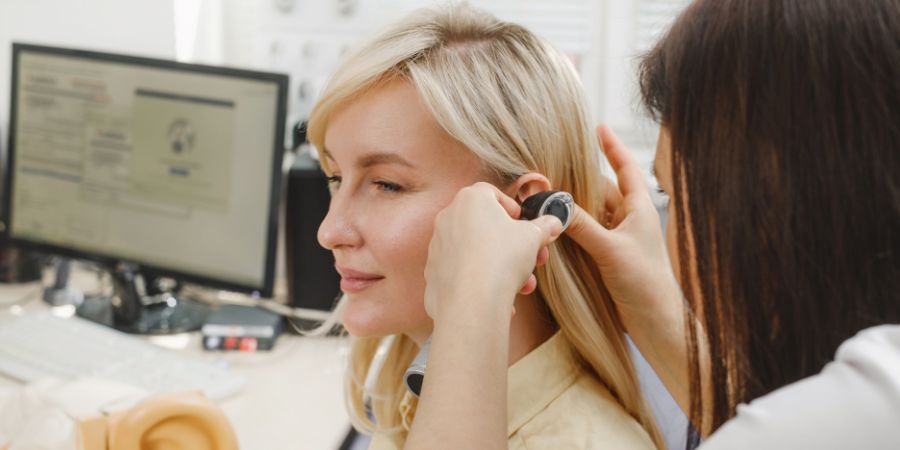You don’t always notice your ears until something feels off. Maybe a dull pressure builds up, or you catch yourself saying “What?” more often than usual. Most people don’t overthink it. You grab a cotton swab, quickly turn it, and figure that’s good enough. It feels like you’ve done something helpful, even though it rarely is. But most of the time, you’re not.
That “quick clean” isn’t cleaning anything. If anything, it’s nudging the wax further in, where it packs tighter and becomes harder to remove. And if you’re using bobby pins, tissues rolled into points, or even fingernails, you’re not alone. But these habits often backfire.
Earwax Isn’t Something to Get Rid of Completely
Before trying to clear it all out, it helps to understand what it’s doing there. Earwax, yes, the waxy stuff you wish didn’t exist, actually protects you. Wax does more than you think. It traps dust and tiny debris before they can move deeper. That slightly acidic nature? It actually helps stop germs from settling in. It also keeps the inside of your ear from cracking or drying out.
Your ears are designed to clear wax out slowly. It travels outward as you talk or chew. Most of the time, it flakes off unnoticed. The problem starts when that natural movement slows down or gets interrupted, usually by overcleaning.
The Habits That Quietly Cause Trouble
It doesn’t come from carelessness. You’re trying to help, same as anyone would. It just turns out your ear isn’t built for those tools. Swabs feel like they fit the shape of the ear. You twist gently, hoping to scoop something out. But wax isn’t sitting at the surface waiting to be plucked. You end up pushing it deeper and creating a blockage.
And then there’s ear candling. The idea sounds satisfying, as if the wax were being melted with heat and suction. But studies and audiologists will tell you it doesn’t work. In fact, the candle often leaves behind more debris or causes burns. You’re left with more problems than you started with.
If You’re Going to Clean, Keep It Simple
For routine care, you don’t need to go deep. A clean washcloth after a warm shower works just fine for wiping the outer ear. That’s the part you can see that is meant to be cleaned.
If you feel like something’s trapped deeper, you might be tempted to rinse it. Some people try bulb syringes with warm water. Some people reach for ear drops to soften the wax. And sometimes they work if the buildup isn’t too deep or dry. But drops can stir up more trouble than relief if you’ve had ear surgery, an infection, or a hole in the eardrum.
Rinsing with warm water sounds harmless, but there’s a catch. If the water’s off in temperature, it might leave you light-headed. If you use too much pressure, it could actually irritate or damage your eardrum. And if the wax is stuck, no flushing will move it; it usually just settles deeper.
Knowing When to Stop Trying at Home
There’s a point where it’s better to stop. If things still feel blocked or your hearing’s dipped, that’s your signal. Guessing won’t help when you don’t know what’s happening inside.
When you see an audiologist, the first thing they do is take a proper look inside your ear. They’ll use a scope that gives a clear view of what’s happening. If they spot wax, they’ll figure out what method fits best, maybe a soft vacuum, a careful rinse, or a small curved tool that lifts it out gently without hurting the skin.
And if there’s no wax? You’ll at least know the cause isn’t something you need to keep poking at.
Why It’s Safer to Get Checked by Someone Trained
There’s a reason trained professionals handle this kind of care. Audiologists aren’t guessing. They’re not following internet hacks or using tools not meant for ears. They use what’s right based on what they actually see in front of them.
You’re not passed around between departments at clinics like professional ear cleaning in Toronto. You’re seen by a registered audiologist who does this daily, using gentle, accurate methods built around your ear’s structure. At Bloor Hearing, appointments are unhurried. You’re not in a loud waiting room. The clinic is a short walk from Dufferin Station and is privately owned, so the care stays focused on you, not on selling products.
You get an ear exam, a clear explanation of what’s happening, and only the needed treatment. No pushing. No pressure.
Staying Clear Without Overdoing It
Once your ears feel normal again, it helps to shift the mindset. You don’t need to clean them constantly. Most ears don’t need frequent cleaning at all. Too much cleaning can actually tell your body to make more wax.
If you wear earplugs, earbuds, or hearing aids, you might have more frequent buildup. That’s not unusual. But even then, it doesn’t mean you should be doing something every week. Just keep an eye or an ear on how things feel. If sounds start fading or something feels blocked, then it’s time for a check. Not before.
As the saying goes, avoid putting anything smaller than your elbow into your ear. And when in doubt, trust someone who knows what they’re looking at.



